The Planetary Health Impacts of Coffee Farming Systems in Latin America: A Review
Abstract
1. Introduction
- Multistory agroforestry with diverse shade trees.
- High biodiversity and ecological complexity, supporting key ecosystem functions.
- Native Arabica varieties.
- Minimal external inputs such as agrochemicals.
- Small-scale farms (<10 ha), often family-owned and operated.
- Integration with local or indigenous knowledge and labor systems.
- High-density coffee monocultures, often with no or low-diversity canopy.
- Ecological simplification and reduced biodiversity.
- Use of Robusta or hybrid Arabica cultivars.
- Heavy reliance on agrochemicals.
- Large-scale operations (>10 ha), often corporate-owned.
- Seasonal wage labor under hierarchical management.
2. Methods
3. Drivers of Transformation in Coffee Landscapes
3.1. Decreasing and Volatile Revenues for Coffee Producers
3.2. Changing Climate
3.3. CLR Outbreaks
4. Coffee Farming’s Impacts on Planetary Boundaries
4.1. Biosphere Integrity
4.1.1. Impacts of CASs on Biodiversity Conservation
4.1.2. Impacts of CASs on NCP
Soil Health, Nutrient Cycling, and Erosion Control
Hydrological Services
Regulation of Microclimate and Extreme Weather
Pollination
Regulation of Detrimental Organisms
Coffee Productivity
4.2. Land-System Change
4.3. Climate Change
4.4. Biogeochemical Flows
4.5. Freshwater Change
4.6. Novel Entities
5. Coffee Farming’s Impacts on Human Health and Its Ecosocial Determinants
5.1. Occupational Health Hazards, Exposure to Dangerous Fauna, and Leishmaniasis
5.2. Impacts on Ecosocial Determinants of Health
5.2.1. Livelihood Diversification and Income
5.2.2. Food Security and Nutrition
5.2.3. Migration
5.2.4. Peace and Security
5.2.5. Gender Equity
5.2.6. Identity, Quality of Life, and Mental Health
6. Discussion
6.1. Human and Planetary Health Impacts of Coffee Farming
6.2. Equity and Identity in the CVC
6.3. Recommended Actions to Protect Planetary Health in Coffee Farming
- -
- Strengthening national coffee institutions and sectoral development plans, including funding mechanisms to support producers during crises.
- -
- Expanding farmer access to credit, land, CLR-resistant seed varieties, inputs, and technical assistance oriented to sustainable practices.
- -
- Providing financial incentives for agroecological production in the form of direct subsidies, payments for ecosystem services, guaranteed minimum prices, and market premiums.
- -
- Developing pricing schemes that internalize social and environmental costs, for instance through targeted taxation mechanisms.
- -
- Incorporating social and environmental labeling.
- -
- Promoting a rational and limited use of pesticides, banning highly hazardous pesticides, and enforcing restrictions.
- -
- Promoting integrated pest management prioritizing complementary alternatives such as biological control, agroforestry, and emerging genomic tools.
- -
- Establishing and enforcing minimum working conditions and safety standards, including provisions to ensure that all farmworkers have proper protective equipment.
- -
- Integrating gender perspectives in sectoral programs, promoting female leadership and specifically addressing time poverty.
- -
- Expanding healthcare, social security, and education services in coffee-growing regions, ensuring access for both resident and seasonal workers.
- -
- Investing in infrastructure and local market access, including for secondary products.
- -
- Establishing mechanisms for an open and equitable access to technological innovations, such as genomic tools for pest control.
- -
- Shortening value chains by linking producers directly to urban consumers.
- -
- Promoting horizontal knowledge exchange and recovery of traditional management practices, protecting biocultural heritage, native seed diversity, and cultural traditions.
6.4. The DPSEEA Framework of Coffee Farming’s Impacts on Planetary Health
6.5. Strengths, Limitations, and Research Gaps
7. Conclusions
Supplementary Materials
Author Contributions
Funding
Institutional Review Board Statement
Informed Consent Statement
Acknowledgments
Conflicts of Interest
References
- The Value of Coffee. Sustainability, Inclusiveness, and Resilience of the Coffee Global Value Chain; International Coffee Organization (ICO): London, UK, 2020.
- FAO Markets and Trade: Coffee. Available online: https://www.fao.org/markets-and-trade/commodities-overview/beverages/coffee/en (accessed on 20 April 2024).
- Scott, M. Climate & Coffee. Available online: http://www.climate.gov/news-features/climate-and/climate-coffee (accessed on 20 April 2024).
- United States Department of Agriculture (USDA). Coffee: World Markets and Trade. Available online: https://fas.usda.gov/data/coffee-world-markets-and-trade (accessed on 20 April 2024).
- Myhrvold, N. Coffee. In Encyclopaedia Britannica; 2024; Available online: https://www.britannica.com/topic/coffee (accessed on 20 April 2024).
- Jha, S.; Bacon, C.; Philpott, S.; Méndez, E.; Läderach, P.; Rice, R. Shade Coffee: Update on a Disappearing Refuge for Biodiversity. Bioscience 2014, 64, 416–428. [Google Scholar] [CrossRef]
- Pham, Y.; Reardon-Smith, K.; Mushtaq, S.; Cockfield, G. The Impact of Climate Change and Variability on Coffee Production: A Systematic Review. Clim. Change 2019, 156, 609–630. [Google Scholar] [CrossRef]
- Perfecto, I.; Jiménez-Soto, M.E.; Vandermeer, J. Coffee Landscapes Shaping the Anthropocene: Forced Simplification on a Complex Agroecological Landscape. Curr. Anthropol. 2019, 60, S236–S250. [Google Scholar] [CrossRef]
- Moguel, P.; Toledo, V.M. Biodiversity Conservation in Traditional Coffee Systems of Mexico. Conserv. Biol. 1999, 13, 11–21. [Google Scholar] [CrossRef]
- Update on the Classification of Nature’s Contributions to People by the Intergovernmental Science-Policy Platform on Biodiversity and Ecosystem Services; IPBES: Bonn, Germany, 2017.
- Davidson, S. Shade Coffee Agro-Ecosystems in Mexico: A Synopsis of the Environmental Services and Socio-Economic Considerations. J. Sustain. For. 2004, 21, 81–95. [Google Scholar] [CrossRef]
- Toledo, V.M.; Moguel, P. Coffee and Sustainability: The Multiple Values of Traditional Shaded Coffee. J. Sustain. Agric. 2012, 36, 353–377. [Google Scholar] [CrossRef]
- Libert-Amico, A.; Paz-Pellat, F. Del papel a la acción en la mitigación y adaptación al cambio climático: La roya del cafeto en Chiapas. Madera Bosques 2018, 24, 2401914. [Google Scholar] [CrossRef]
- Fernandez, M.; Méndez, V.E. Subsistence under the Canopy: Agrobiodiversity’s Contributions to Food and Nutrition Security amongst Coffee Communities in Chiapas, Mexico. Agroecol. Sustain. Food Syst. 2019, 43, 579–601. [Google Scholar] [CrossRef]
- Anderzén, J.; Guzmán Luna, A.; Luna-González, D.V.; Merrill, S.C.; Caswell, M.; Méndez, V.E.; Hernández Jonapá, R.; Mier y Terán Giménez Cacho, M. Effects of On-Farm Diversification Strategies on Smallholder Coffee Farmer Food Security and Income Sufficiency in Chiapas, Mexico. J. Rural Stud. 2020, 77, 33–46. [Google Scholar] [CrossRef]
- Conti, C.L.; Barbosa, W.M.; Simão, J.B.P.; Álvares-da-Silva, A.M. Pesticide Exposure, Tobacco Use, Poor Self-Perceived Health and Presence of Chronic Disease Are Determinants of Depressive Symptoms among Coffee Growers from Southeast Brazil. Psychiatry Res. 2018, 260, 187–192. [Google Scholar] [CrossRef]
- Hutter, H.-P.; Kundi, M.; Lemmerer, K.; Poteser, M.; Weitensfelder, L.; Wallner, P.; Moshammer, H. Subjective Symptoms of Male Workers Linked to Occupational Pesticide Exposure on Coffee Plantations in the Jarabacoa Region, Dominican Republic. Int. J. Environ. Res. Public Health 2018, 15, 2099. [Google Scholar] [CrossRef]
- Nieto-Betancurt, L.; Mosquera-Becerra, J.; Fandiño-Losada, A.; Guava, L.A.S. Suicide and Medical Practices: Assessing the Way of Life among Colombian Coffee-Growing Rural Men in Mental Health Care. Salud Colect. 2024, 20, e4663. [Google Scholar] [CrossRef]
- Harvey, C.A.; Pritts, A.A.; Zwetsloot, M.J.; Jansen, K.; Pulleman, M.M.; Armbrecht, I.; Avelino, J.; Barrera, J.F.; Bunn, C.; García, J.H.; et al. Transformation of Coffee-Growing Landscapes across Latin America. A Review. Agron. Sustain. Dev. 2021, 41, 62. [Google Scholar] [CrossRef]
- Valencia, V.; García-Barrios, L.; Sterling, E.J.; West, P.; Meza-Jiménez, A.; Naeem, S. Smallholder Response to Environmental Change: Impacts of Coffee Leaf Rust in a Forest Frontier in Mexico. Land Use Policy 2018, 79, 463–474. [Google Scholar] [CrossRef]
- Whitmee, S.; Haines, A.; Beyrer, C.; Boltz, F.; Capon, A.G.; Dias, B.F.d.S.; Ezeh, A.; Frumkin, H.; Gong, P.; Head, P.; et al. Safeguarding Human Health in the Anthropocene Epoch: Report of The Rockefeller Foundation–Lancet Commission on Planetary Health. Lancet 2015, 386, 1973–2028. [Google Scholar] [CrossRef]
- Escobar-Ocampo, M.C.; Castillo-Santiago, M.Á.; Ochoa-Gaona, S.; Enríquez, P.L.; Mondragón-Vázquez, E.; Espinosa-Jiménez, F.R.; Sibelet, N. Drivers of Land-Use Change in Agroforestry Landscapes of Southern Mexico. Hum. Ecol. 2023, 51, 409–422. [Google Scholar] [CrossRef]
- Gabriel-Hernández, L.; Barradas, V.L. Panorama of Coffee Cultivation in the Central Zone of Veracruz State, Mexico: Identification of Main Stressors and Challenges to Face. Sustainability 2024, 16, 802. [Google Scholar] [CrossRef]
- Griffith, D.; Zamudio Grave, P.; Cortés Viveros, R.; Cabrera Cabrera, J. Losing Labor: Coffee, Migration, and Economic Change in Veracruz, Mexico. Cult. Agric. Food Environ. 2017, 39, 35–42. [Google Scholar] [CrossRef]
- Renard, M.C. Chapter 5: Free Trade of Coffee, Exodus of Coffee Workers: The Case of the Southern Mexican Border Region of the State of Chiapas. Res. Rural Sociol. Dev. 2011, 17, 147–165. [Google Scholar] [CrossRef]
- Cordes, K.Y.; Sagan, M.; Kennedy, S. Responsible Coffee Sourcing: Towards a Living Income for Producers. Columbia Cent. Sustain. Invest. 2021. [Google Scholar] [CrossRef]
- Panhuysen, S.; de Vries, F. Coffee Barometer; Conservation International and Solidaridad: Arlington, VA, USA, 2023. [Google Scholar]
- Rettberg, A. Global Markets, Local Conflict: Violence in the Colombian Coffee Region after the Breakdown of the International Coffee Agreement. Lat. Am. Perspect. 2010, 37, 111–132. [Google Scholar] [CrossRef]
- Hausermann, H. Maintaining the Coffee Canopy: Understanding Change and Continuity in Central Veracruz. Hum. Ecol. 2014, 42, 381–394. [Google Scholar] [CrossRef]
- Utrilla-Catalan, R.; Rodríguez-Rivero, R.; Narvaez, V.; Díaz-Barcos, V.; Blanco, M.; Galeano, J. Growing Inequality in the Coffee Global Value Chain: A Complex Network Assessment. Sustainability 2022, 14, 672. [Google Scholar] [CrossRef]
- Samper, L.; Giovannucci, D.; Vieira, L. The Powerful Role of Intangibles in the Coffee Value Chain; Economic Research Working Paper; World Intellectual Property Organization: Geneva, Switzerland, 2017. [Google Scholar]
- Braunschweig, T.; Kohli, A.; Lang, S. Agricultural Commodity Traders in Switzerland: Benefitting from Misery; Public Eye Repository: Zürich, Switzerland, 2019. [Google Scholar]
- Lalani, B.; Lanza, G.; Leiva, B.; Mercado, L.; Haggar, J. Shade versus Intensification: Trade-off or Synergy for Profitability in Coffee Agroforestry Systems? Agric. Syst. 2024, 214, 103814. [Google Scholar] [CrossRef]
- Campos, A. Certified Coffee, Rightless Workers; Gomes, M., Ed.; Monitor; Repórter Brasil—RPBR: São Paulo, Brazil, 2016; ISBN 978-85-61252-28-1. [Google Scholar]
- Dallabrida, P.; Campos, A. Certified Coffee, Rightless Workers 2; Gomes, M., Ed.; Repórter Brasil—RPBR: Sao Paolo, Brazil, 2021. [Google Scholar]
- Macrotrends. Coffee Prices (1973–2025). Available online: https://www.macrotrends.net/2535/coffee-prices-historical-chart-data (accessed on 30 August 2025).
- U.S. Bureau of Labor Statistics. Consumer Price Index (CPI) Databases. Available online: https://www.bls.gov/cpi/data.htm (accessed on 30 August 2025).
- Barrios-Puente, G.; Galván-Manuel, O.; Pérez-Soto, F.; Sangerman-Jarquín, D.M.; García-Sánchez, R.C.; Barrios-Puente, G.; Galván-Manuel, O.; Pérez-Soto, F.; Sangerman-Jarquín, D.M.; García-Sánchez, R.C. Price Hedging for Coffee, Using the Futures Market. Rev. Mex. Cienc. Agrícolas 2022, 13, 1147–1154. [Google Scholar] [CrossRef]
- Futures Markets: The Role of Non-Commercial Traders; International Coffee Council: London, UK, 2019.
- Bacon, C.M. A Spot of Coffee in Crisis: Nicaraguan Smallholder Cooperatives, Fair Trade Networks, and Gendered Empowerment. Lat. Am. Perspect. 2010, 37, 50–71. [Google Scholar] [CrossRef]
- Gresser, C.; Tickell, S. Mugged: Poverty in Your Coffee Cup; Oxfam International: Nairobi, Kenya, 2002. [Google Scholar]
- Harvey, C.A.; Saborio-Rodríguez, M.; Martinez-Rodríguez, M.R.; Viguera, B.; Chain-Guadarrama, A.; Vignola, R.; Alpizar, F. Climate Change Impacts and Adaptation among Smallholder Farmers in Central America. Agric. Food Secur. 2018, 7, 57. [Google Scholar] [CrossRef]
- Fromm, I. Climate Change Impacts, Food Insecurity and Migration: An Analysis of the Current Crisis in Honduras. In Migrations and Diasporas: Struggles Between Inclusion and Exclusion; Emerald Publishing Limited: Leeds, UK, 2023; pp. 137–149. [Google Scholar] [CrossRef]
- Bilen, C.; El Chami, D.; Mereu, V.; Trabucco, A.; Marras, S.; Spano, D. A Systematic Review on the Impacts of Climate Change on Coffee Agrosystems. Plants 2023, 12, 102. [Google Scholar] [CrossRef]
- Avelino, J.; Cristancho, M.; Georgiou, S.; Imbach, P.; Aguilar, L.; Bornemann, G.; Läderach, P.; Anzueto, F.; Hruska, A.J.; Morales, C. The Coffee Rust Crises in Colombia and Central America (2008–2013): Impacts, Plausible Causes and Proposed Solutions. Food Sec. 2015, 7, 303–321. [Google Scholar] [CrossRef]
- Chort, I.; Öktem, B. Agricultural Shocks, Coping Policies and Deforestation: Evidence from the Coffee Leaf Rust Epidemic in Mexico. Am. J. Agric. Econ. 2024, 106, 1020–1057. [Google Scholar] [CrossRef]
- Richardson, K.; Steffen, W.; Lucht, W.; Bendtsen, J.; Cornell, S.E.; Donges, J.F.; Drüke, M.; Fetzer, I.; Bala, G.; von Bloh, W.; et al. Earth beyond Six of Nine Planetary Boundaries. Sci. Adv. 2023, 9, eadh2458. [Google Scholar] [CrossRef]
- Philpott, S.M.; Arendt, W.J.; Armbrecht, I.; Bichier, P.; Diestch, T.V.; Gordon, C.; Greenberg, R.; Perfecto, I.; Reynoso-Santos, R.; Soto-Pinto, L.; et al. Biodiversity Loss in Latin American Coffee Landscapes: Review of the Evidence on Ants, Birds, and Trees. Conserv. Biol. 2008, 22, 1093–1105. [Google Scholar] [CrossRef]
- Manson, S.; Nekaris, K.A.I.; Nijman, V.; Campera, M. Effect of Shade on Biodiversity within Coffee Farms: A Meta-Analysis. Sci. Total Environ. 2024, 914, 169882. [Google Scholar] [CrossRef]
- Jha, S.; Vandermeer, J.H. Impacts of Coffee Agroforestry Management on Tropical Bee Communities. Biol. Conserv. 2010, 143, 1423–1431. [Google Scholar] [CrossRef]
- Vaidya, C.; Fitch, G.; Martinez, G.H.D.; Oana, A.M.; Vandermeer, J. Management Practices and Seasonality Affect Stingless Bee Colony Growth, Foraging Activity, and Pollen Diet in Coffee Agroecosystems. Agric. Ecosyst. Environ. 2023, 353, 108552. [Google Scholar] [CrossRef]
- Murrieta-Galindo, R.; González-Romero, A.; López-Barrera, F.; Parra-Olea, G. Coffee Agrosystems: An Important Refuge for Amphibians in Central Veracruz, Mexico. Agrofor. Syst. 2013, 87, 767–779. [Google Scholar] [CrossRef]
- Ríos-Orjuela, J.C.; Falcón-Espitia, N.; Arias-Escobar, A.; Plazas-Cardona, D. Conserving Biodiversity in Coffee Agroecosystems: Insights from a Herpetofauna Study in the Colombian Andes with Sustainable Management Proposal. Perspect. Ecol. Conserv. 2024, 22, 196–204. [Google Scholar] [CrossRef]
- Sternhagen, E.C.; Black, K.L.; Hartmann, E.D.L.; Shivega, W.G.; Johnson, P.G.; McGlynn, R.D.; Schmaltz, L.C.; Asheim Keller, R.J.; Vink, S.N.; Aldrich-Wolfe, L. Contrasting Patterns of Functional Diversity in Coffee Root Fungal Communities Associated with Organic and Conventionally Managed Fields. Appl. Environ. Microbiol. 2020, 86, e00052-20. [Google Scholar] [CrossRef]
- Caldwell, A.C.; Silva, L.C.F.; Da Silva, C.C.; Ouverney, C.C. Prokaryotic Diversity in the Rhizosphere of Organic, Intensive, and Transitional Coffee Farms in Brazil. PLoS ONE 2015, 10, 106355. [Google Scholar] [CrossRef]
- Carrasco-Espinosa, K.; Avitia, M.; Barrón-Sandoval, A.; Abbruzzini, T.F.; Salazar Cabrera, U.I.; Arroyo-Lambaer, D.; Uscanga, A.; Campo, J.; Benítez, M.; Wegier, A.; et al. Land-Use Change and Management Intensification Is Associated with Shifts in Composition of Soil Microbial Communities and Their Functional Diversity in Coffee Agroecosystems. Microorganisms 2022, 10, 1763. [Google Scholar] [CrossRef]
- Libert Amico, A.; Ituarte-Lima, C.; Elmqvist, T. Learning from Social–Ecological Crisis for Legal Resilience Building: Multi-Scale Dynamics in the Coffee Rust Epidemic. Sustain. Sci. 2020, 15, 485–501. [Google Scholar] [CrossRef]
- Bedoya-Durán, M.J.; Jones, H.H.; Malone, K.M.; Branch, L.C. Continuous Forest at Higher Elevation Plays a Key Role in Maintaining Bird and Mammal Diversity across an Andean Coffee-Growing Landscape. Anim. Conserv. 2023, 26, 714–728. [Google Scholar] [CrossRef]
- De Beenhouwer, M.; Aerts, R.; Honnay, O. A Global Meta-Analysis of the Biodiversity and Ecosystem Service Benefits of Coffee and Cacao Agroforestry. Agric. Ecosyst. Environ. 2013, 175, 1–7. [Google Scholar] [CrossRef]
- Chandler, R.B.; King, D.I.; Raudales, R.; Trubey, R.; Chandler, C.; Arce Chávez, V.J. A Small-Scale Land-Sparing Approach to Conserving Biological Diversity in Tropical Agricultural Landscapes. Conserv. Biol. 2013, 27, 785–795. [Google Scholar] [CrossRef]
- Molina-Monteleón, C.M.; Mauricio-Gutiérrez, A.; Castelán-Vega, R.; Tamariz-Flores, J.V. Importance of Soil Health for Coffea Spp. Cultivation from a Cooperative Society in Puebla, Mexico. Land 2024, 13, 541. [Google Scholar] [CrossRef]
- Tully, K.L.; Wood, S.A.; Lawrence, D. Fertilizer Type and Species Composition Affect Leachate Nutrient Concentrations in Coffee Agroecosystems. Agrofor. Syst. 2013, 87, 1083–1100. [Google Scholar] [CrossRef]
- Souza, H.N.D.; de Goede, R.G.M.; Brussaard, L.; Cardoso, I.M.; Duarte, E.M.G.; Fernandes, R.B.A.; Gomes, L.C.; Pulleman, M.M. Protective Shade, Tree Diversity and Soil Properties in Coffee Agroforestry Systems in the Atlantic Rainforest Biome. Agric. Ecosyst. Environ. 2012, 146, 179–196. [Google Scholar] [CrossRef]
- Tully, K.L.; Lawrence, D.; Scanlon, T.M. More Trees Less Loss: Nitrogen Leaching Losses Decrease with Increasing Biomass in Coffee Agroforests. Agric. Ecosyst. Environ. 2012, 161, 137–144. [Google Scholar] [CrossRef]
- Sauvadet, M.; den Meersche, K.V.; Allinne, C.; Gay, F.; de Melo Virginio Filho, E.; Chauvat, M.; Becquer, T.; Tixier, P.; Harmand, J.-M. Shade Trees Have Higher Impact on Soil Nutrient Availability and Food Web in Organic than Conventional Coffee Agroforestry. Sci. Total Environ. 2019, 649, 1065–1074. [Google Scholar] [CrossRef] [PubMed]
- Babbar, L.I.; Zak, D.R. Nitrogen Loss from Coffee Agroecosystems in Costa Rica: Leaching and Denitrification in the Presence and Absence of Shade Trees. J. Environ. Qual. 1995, 24, 227–233. [Google Scholar] [CrossRef]
- Cerretelli, S.; Castellanos, E.; González-Mollinedo, S.; Lopez, E.; Ospina, A.; Haggar, J. A Scenario Modelling Approach to Assess Management Impacts on Soil Erosion in Coffee Systems in Central America. Catena 2023, 228, 107182. [Google Scholar] [CrossRef]
- Lozano-Baez, S.E.; Domínguez-Haydar, Y.; Di Prima, S.; Cooper, M.; Castellini, M. Shade-Grown Coffee in Colombia Benefits Soil Hydraulic Conductivity. Sustainability 2021, 13, 7768. [Google Scholar] [CrossRef]
- Gómez-Delgado, F.; Roupsard, O.; Le Maire, G.; Taugourdeau, S.; Pérez, A.; Van Oijen, M.; Vaast, P.; Rapidel, B.; Harmand, J.M.; Voltz, M.; et al. Modelling the Hydrological Behaviour of a Coffee Agroforestry Basin in Costa Rica. Hydrol. Earth Syst. Sci. 2011, 15, 369–392. [Google Scholar] [CrossRef]
- López-Ramírez, S.M.; Sáenz, L.; Mayer, A.; Muñoz-Villers, L.E.; Asbjornsen, H.; Berry, Z.C.; Looker, N.; Manson, R.; Gómez-Aguilar, L.R. Land Use Change Effects on Catchment Streamflow Response in a Humid Tropical Montane Cloud Forest Region, Central Veracruz, Mexico. Hydrol. Process. 2020, 34, 3555–3570. [Google Scholar] [CrossRef]
- Noriega-Puglisevich, J.A.; Eckhardt, K.I. Hydrological Effects of the Conversion of Tropical Montane Forest to Agricultural Land in the Central Andes of Peru. Environ. Qual. Manag. 2024, 34, e22221. [Google Scholar] [CrossRef]
- Padovan, M.P.; Brook, R.M.; Barrios, M.; Cruz-Castillo, J.B.; Vilchez-Mendoza, S.J.; Costa, A.N.; Rapidel, B. Water Loss by Transpiration and Soil Evaporation in Coffee Shaded by Tabebuia Rosea Bertol. and Simarouba Glauca Dc. Compared to Unshaded Coffee in Sub-Optimal Environmental Conditions. Agric. For. Meterol. 2018, 248, 1–14. [Google Scholar] [CrossRef]
- Zaro, G.C.; Caramori, P.H.; Wrege, M.S.; Caldana, N.F.D.S.; Filho, J.S.D.V.; Morais, H.; Junior, G.M.Y.; Caramori, D.C. Coffee Crops Adaptation to Climate Change in Agroforestry Systems with Rubber Trees in Southern Brazil. Sci. Agric. 2022, 80, e20210142. [Google Scholar] [CrossRef]
- Coltri, P.P.; Pinto, H.S.; Gonçalves, R.R.D.V.; Zullo Junior, J.; Dubreuil, V. Low Levels of Shade and Climate Change Adaptation of Arabica Coffee in Southeastern Brazil. Heliyon 2019, 5, e01263. [Google Scholar] [CrossRef] [PubMed]
- Lin, B.B. Agroforestry Management as an Adaptive Strategy against Potential Microclimate Extremes in Coffee Agriculture. Agric. For. Meterol. 2007, 144, 85–94. [Google Scholar] [CrossRef]
- Philpott, S.M.; Lin, B.B.; Jha, S.; Brines, S.J. A Multi-Scale Assessment of Hurricane Impacts on Agricultural Landscapes Based on Land Use and Topographic Features. Agric. Ecosyst. Environ. 2008, 128, 12–20. [Google Scholar] [CrossRef]
- Mayorga, I.; Vargas de Mendonça, J.L.; Hajian-Forooshani, Z.; Lugo-Perez, J.; Perfecto, I. Tradeoffs and Synergies among Ecosystem Services, Biodiversity Conservation, and Food Production in Coffee Agroforestry. Front. For. Glob. Change 2022, 5, 690164. [Google Scholar] [CrossRef]
- Perfecto, I.; Hajian-Forooshani, Z.; Iverson, A.; Irizarry, A.D.; Lugo-Perez, J.; Medina, N.; Vaidya, C.; White, A.; Vandermeer, J. Response of Coffee Farms to Hurricane Maria: Resistance and Resilience from an Extreme Climatic Event. Sci. Rep. 2019, 9, 15668. [Google Scholar] [CrossRef] [PubMed]
- Irizarry, A.D.; Collazo, J.A.; Vandermeer, J.; Perfecto, I. Coffee Plantations, Hurricanes and Avian Resiliency: Insights from Occupancy, and Local Colonization and Extinction Rates in Puerto Rico. Glob. Ecol. Conserv. 2021, 27, e01579. [Google Scholar] [CrossRef]
- Moreaux, C.; Meireles, D.A.L.; Sonne, J.; Badano, E.I.; Classen, A.; González-Chaves, A.; Hipólito, J.; Klein, A.-M.; Maruyama, P.K.; Metzger, J.P.; et al. The Value of Biotic Pollination and Dense Forest for Fruit Set of Arabica Coffee: A Global Assessment. Agric. Ecosyst. Environ. 2022, 323, 107680. [Google Scholar] [CrossRef]
- Latini, A.O.; Silva, D.P.; Souza, F.M.L.; Ferreira, M.C.; Moura, M.S.D.; Suarez, N.F. Reconciling Coffee Productivity and Natural Vegetation Conservation in an Agroecosystem Landscape in Brazil. J. Nat. Conserv. 2020, 57, 125902. [Google Scholar] [CrossRef]
- Machado, A.C.P.; Baronio, G.J.; Soares Novaes, C.; Ollerton, J.; Wolowski Torres, M.; Natalina Silva Lopes, D.; Rech, A.R. Optimizing Coffee Production: Increased Floral Visitation and Bean Quality at Plantation Edges with Wild Pollinators and Natural Vegetation. J. Appl. Ecol. 2024, 61, 465–475. [Google Scholar] [CrossRef]
- Karp, D.S.; Mendenhall, C.D.; Sandí, R.F.; Chaumont, N.; Ehrlich, P.R.; Hadly, E.A.; Daily, G.C. Forest Bolsters Bird Abundance, Pest Control and Coffee Yield. Ecol. Lett. 2013, 16, 1339–1347. [Google Scholar] [CrossRef]
- Koutouleas, A.; Collinge, D.B.; Ræbild, A. Alternative Plant Protection Strategies for Tomorrow’s Coffee. Plant Pathol. 2023, 72, 409–429. [Google Scholar] [CrossRef]
- Moreno-Ramirez, N.; Bianchi, F.J.J.A.; Manzano, M.R.; Dicke, M. Ecology and Management of the Coffee Berry Borer (Hypothenemus hampei): The Potential of Biological Control. BioControl 2024, 69, 199–214. [Google Scholar] [CrossRef]
- Cerda, R.; Avelino, J.; Harvey, C.A.; Gary, C.; Tixier, P.; Allinne, C. Coffee Agroforestry Systems Capable of Reducing Disease-Induced Yield and Economic Losses While Providing Multiple Ecosystem Services. Crop Prot. 2020, 134, 105149. [Google Scholar] [CrossRef]
- Piato, K.; Subía, C.; Pico, J.; Calderón, D.; Norgrove, L.; Lefort, F. Organic Farming Practices and Shade Trees Reduce Pest Infestations in Robusta Coffee Systems in Amazonia. Life 2021, 11, 413. [Google Scholar] [CrossRef] [PubMed]
- Hajian-Forooshani, Z.; Salinas, I.S.R.; Jiménez-Soto, E.; Perfecto, I.; Vandermeer, J. Impact of Regionally Distinct Agroecosystem Communities on the Potential for Autonomous Control of the Coffee Leaf Rust. Environ. Entomol. 2016, 45, 1521–1526. [Google Scholar] [CrossRef] [PubMed]
- Piato, K.; Subía, C.; Lefort, F.; Pico, J.; Calderón, D.; Norgrove, L. No Reduction in Yield of Young Robusta Coffee When Grown under Shade Trees in Ecuadorian Amazonia. Life 2022, 12, 807. [Google Scholar] [CrossRef]
- Rossi, E.; Montagnini, F.; de Melo Virginio Filho, E. Effects of Management Practices on Coffee Productivity and Herbaceous Species Diversity in Agroforestry Systems in Costa Rica. In Agroforestry as a Tool for Landscape Restoration; Nova Science Publishers Inc.: Hauppauge, NY, USA, 2011; pp. 113–132. ISBN 978-161728940-8. [Google Scholar]
- Capa, D.; Pérez-Esteban, J.; Masaguer, A. Unsustainability of Recommended Fertilization Rates for Coffee Monoculture Due to High N2O Emissions. Agron. Sustain. Dev. 2015, 35, 1551–1559. [Google Scholar] [CrossRef]
- Martínez-Salinas, A.; Chain-Guadarrama, A.; Aristizábal, N.; Vilchez-Mendoza, S.; Cerda, R.; Ricketts, T.H. Interacting Pest Control and Pollination Services in Coffee Systems. Proc. Natl. Acad. Sci. USA 2022, 119, e2119959119. [Google Scholar] [CrossRef]
- Pronti, A.; Coccia, M. Agroecological and Conventional Agricultural Systems: Comparative Analysis of Coffee Farms in Brazil for Sustainable Development. Int. J. Sustain. Dev. 2020, 23, 223–248. [Google Scholar] [CrossRef]
- Sporchia, F.; Taherzadeh, O.; Caro, D. Stimulating Environmental Degradation: A Global Study of Resource Use in Cocoa, Coffee, Tea and Tobacco Supply Chains. Curr. Res. Environ. Sustain. 2021, 3, 100029. [Google Scholar] [CrossRef]
- Pendrill, F.; Persson, U.M.; Kastner, T. Deforestation Risk Embodied in Production and Consumption of Agricultural and Forestry Commodities 2005–2017. Zenodo. 2020. Available online: https://zenodo.org/records/10633818 (accessed on 5 August 2024).
- Forest Loss in Latin America and the Caribbean from 1990 to 2020: The Statistical Evidence; ECLAC Statistical Briefings; Economic Commission for Latin America and the Caribbean (ECLAC): Santiago, Chile, 2021.
- FAO. State of the World’s Forests, 1997; Words and Publications: Oxford, UK, 1997; ISBN 92-5-103977-1. [Google Scholar]
- Pendrill, F.; Persson, U.M.; Godar, J.; Kastner, T. Deforestation Displaced: Trade in Forest-Risk Commodities and the Prospects for a Global Forest Transition. Environ. Res. Lett. 2019, 14, 055003. [Google Scholar] [CrossRef]
- Perfecto, I.; Rice, R.A.; Greenberg, R.; Van der Voort, M.E. Shade Coffee: A Disappearing Refuge for Biodiversity: Shade Coffee Plantations Can Contain as Much Biodiversity as Forest Habitats. BioScience 1996, 46, 598–608. [Google Scholar] [CrossRef]
- Bass, J.O.J. Forty Years and More Trees: Land Cover Change and Coffee Production in Honduras. Southeast. Geogr. 2006, 46, 51–65. [Google Scholar] [CrossRef]
- Usva, K.; Sinkko, T.; Silvenius, F.; Riipi, I.; Heusala, H. Carbon and Water Footprint of Coffee Consumed in Finland—Life Cycle Assessment. Int. J. Life Cycle Assess. 2020, 25, 1976–1990. [Google Scholar] [CrossRef]
- Martins, L.D.; Eugenio, F.C.; Rodrigues, W.N.; Tomaz, M.A.; dos Santos, A.R.; Ramalho, J.C. Carbon and Water Footprints in Brazilian Coffee Plantations—The Spatial and Temporal Distribution. Emir. J. Food Agric. 2018, 30, 482–487. [Google Scholar]
- Arellano, C.; Hernández, C. Carbon Footprint and Carbon Storing Capacity of Arabica Coffee Plantations of Central America: A Review. Coffee Sci. 2023, 18, e182072. [Google Scholar] [CrossRef]
- Van Rikxoort, H.; Schroth, G.; Läderach, P.; Rodríguez-Sánchez, B. Carbon Footprints and Carbon Stocks Reveal Climate-Friendly Coffee Production. Agron. Sustain. Dev. 2014, 34, 887–897. [Google Scholar] [CrossRef]
- Acosta-Alba, I.; Boissy, J.; Chia, E.; Andrieu, N. Integrating Diversity of Smallholder Coffee Cropping Systems in Environmental Analysis. Int. J. Life Cycle Assess. 2020, 25, 252–266. [Google Scholar] [CrossRef]
- Coltro, L.; Tavares, M.P.; Sturaro, K.B.F.S. Life Cycle Assessment of Conventional and Organic Arabica Coffees: From Farm to Pack. Int. J. Life Cycle Assess. 2024, 29, 1672–1687. [Google Scholar] [CrossRef]
- Calvillo-Arriola, A.E.; Sotelo-Navarro, P.X. A Step towards Sustainability: Life Cycle Assessment of Coffee Produced in the Indigenous Community of Ocotepec, Chiapas, Mexico. Discov. Sustain. 2024, 5, 17. [Google Scholar] [CrossRef]
- Rules on Statistics Statistical Reports; International Coffee Organization (ICO): London, UK, 2011.
- Quiñones-Huatangari, L.; Fernandez-Zarate, F.H.; Huaccha-Castillo, A.E. Nitrous Oxide Emissions Generated in Coffee Cultivation: A Systematic Review. Nat. Environ. Pollut. Technol. 2022, 21, 1697–1703. [Google Scholar] [CrossRef]
- Rockström, J.; Steffen, W.; Noone, K.; Persson, Å.; Chapin, F.S.; Lambin, E.F.; Lenton, T.M.; Scheffer, M.; Folke, C.; Schellnhuber, H.J.; et al. A Safe Operating Space for Humanity. Nature 2009, 461, 472–475. [Google Scholar] [CrossRef]
- Vázquez, G.; Aké-Castillo, J.A.; Favila, M.E. Algal Assemblages and Their Relationship with Water Quality in Tropical Mexican Streams with Different Land Uses. Hydrobiologia 2011, 667, 173–189. [Google Scholar] [CrossRef]
- De Jesús Crespo, R.; Douthat, T.; Pringle, C. Stream Friendly Coffee: Evaluating the Impact of Coffee Farming on High-Elevation Streams of the Tarrazú Coffee Region of Costa Rica. Hydrobiologia 2020, 847, 1903–1923. [Google Scholar] [CrossRef]
- Olguín, E.J.; Sánchez, G.; Mercado, G. Cleaner Production and Environmentally Sound Biotechnology for the Prevention of Upstream Nutrient Pollution in the Mexican Coast of the Gulf of México. Ocean Coast. Manag. 2004, 47, 641–670. [Google Scholar] [CrossRef]
- Steffen, W.; Richardson, K.; Rockström, J.; Cornell, S.E.; Fetzer, I.; Bennett, E.M.; Biggs, R.; Carpenter, S.R.; De Vries, W.; De Wit, C.A.; et al. Planetary Boundaries: Guiding Human Development on a Changing Planet. Science 2015, 347, 1259855. [Google Scholar] [CrossRef]
- Chapagain, A.K.; Hoekstra, A.Y. The Water Footprint of Coffee and Tea Consumption in the Netherlands. Ecol. Econ. 2007, 64, 109–118. [Google Scholar] [CrossRef]
- Leal-Echeverri, J.C.; Tobón, C. The Water Footprint of Coffee Production in Colombia. Rev. Fac. Nac. Agron. Medellín 2021, 74, 9685–9697. [Google Scholar] [CrossRef]
- De Queiroz, V.T.; Azevedo, M.M.; da Silva Quadros, I.P.; Costa, A.V.; do Amaral, A.A.; dos Santos, G.M.A.D.A.; Juvanhol, R.S.; de Almeida Telles, L.A.; dos Santos, A.R. Environmental Risk Assessment for Sustainable Pesticide Use in Coffee Production. J. Contam. Hydrol. 2018, 219, 18–27. [Google Scholar] [CrossRef]
- García Ríos, A.; Martínez, A.S.; Londoño, Á.L.; Restrepo, B.; Landázuri, P. Determination of Organochlorine and Organophosphorus Residues in Surface Waters from the Coffee Zone in Quindío, Colombia. J. Environ. Sci. Health Part B Pestic. Food Contamin. Agric. Wastes 2020, 55, 968–973. [Google Scholar] [CrossRef]
- Coltro, L.; Mourad, A.L.; Oliveira, P.A.P.L.V.; Baddini, J.P.O.A.; Kletecke, R.M. Environmental Profile of Brazilian Green Coffee. Int. J. Life Cycle Assess. 2006, 11, 16–21. [Google Scholar] [CrossRef]
- Londoño, Á.L.; Restrepo, B.; Sánchez, J.F.; García-Ríos, A.; Bayona, A.; Landázuri, P. Pesticides and Hypothyroidism in Farmers of Plantain and Coffee Growing Areas in Quindío, Colombia. Rev. Salud Publica 2018, 20, 215–220. [Google Scholar] [CrossRef]
- Merhi, A.; Kordahi, R.; Hassan, H.F. A Review on the Pesticides in Coffee: Usage, Health Effects, Detection, and Mitigation. Front. Public Health 2022, 10, 1004570. [Google Scholar] [CrossRef] [PubMed]
- PAN International List of Highly Hazardous Pesticides; PAN International: Geneva, Switzerland, 2021.
- Palomino-García, L.R.; Vargas-Vásquez, M.L. Identification of Hazards and Assessment of Risks Associated with the Harvesting of Coffee. Puerto Rico Health Sci. J. 2023, 42, 43–49. [Google Scholar]
- Hutter, H.-P.; Khan, A.W.; Lemmerer, K.; Wallner, P.; Kundi, M.; Moshammer, H. Cytotoxic and Genotoxic Effects of Pesticide Exposure in Male Coffee Farmworkers of the Jarabacoa Region, Dominican Republic. Int. J. Environ. Res. Public Health 2018, 15, 1641. [Google Scholar] [CrossRef]
- Moshammer, H.; Poteser, M.; Hutter, H.-P. More Pesticides—Less Children? Wien. Klin. Wochenschr. 2020, 132, 197–204. [Google Scholar] [CrossRef]
- Bedoya, P.S.; García, R.A.; Londoño, F.A.L.; Restrepo, C.B. Determination of Organochlorine Pesticide Residues In Serum of Coffee and Banana Growers in the Departament of Quindío by Gc-Μecd. Rev. Colomb. Quim. 2014, 43, 11–16. [Google Scholar] [CrossRef]
- Bolognesi, C.; Carrasquilla, G.; Volpi, S.; Solomon, K.R.; Marshall, E.J.P. Biomonitoring of Genotoxic Risk in Agricultural Workers from Five Colombian Regions: Association to Occupational Exposure to Glyphosate. J. Toxicol. Environ. Health Part A Curr. Iss. 2009, 72, 986–997. [Google Scholar] [CrossRef] [PubMed]
- Reichert, B.; de Kok, A.; Pizzutti, I.R.; Scholten, J.; Cardoso, C.D.; Spanjer, M. Simultaneous Determination of 117 Pesticides and 30 Mycotoxins in Raw Coffee, without Clean-up, by LC-ESI-MS/MS Analysis. Anal Chim. Acta 2018, 1004, 40–50. [Google Scholar] [CrossRef]
- Estrada-Muñoz, C.; Madrid-Casaca, H.; Salazar-Sepúlveda, G.; Contreras-Barraza, N.; Iturra-González, J.; Vega-Muñoz, A. Musculoskeletal Symptoms and Assessment of Ergonomic Risk Factors on a Coffee Farm. Appl. Sci. 2022, 12, 7703. [Google Scholar] [CrossRef]
- Jimenez-Soto, E. The Political Ecology of Shaded Coffee Plantations: Conservation Narratives and the Everyday-Lived-Experience of Farmworkers. J. Peasant Stud. 2021, 48, 1284–1303. [Google Scholar] [CrossRef]
- Mise, Y.F.; Lira-da-Silva, R.M.; Carvalho, F.M. Agriculture and Snakebite in Bahia, Brazil—An Ecological Study. Ann. Agric. Environ. Med. 2016, 23, 416–419. [Google Scholar] [CrossRef]
- Ocampo, C.B.; Ferro, M.C.; Cadena, H.; Gongora, R.; Pérez, M.; Valderrama-Ardila, C.H.; Quinnell, R.J.; Alexander, N. Environmental Factors Associated with American Cutaneous Leishmaniasis in a New Andean Focus in Colombia. Trop. Med. Int. Health 2012, 17, 1309–1317. [Google Scholar] [CrossRef] [PubMed]
- Alexander, B.; Agudelo, L.A.; Navarro, J.F.; Ruiz, J.F.; Molina, J.; Aguilera, G.; Klein, A.; Quiñones, M.L. Relationship between Coffee Cultivation Practices in Colombia and Exposure to Infection with Leishmania. Trans. R. Soc. Trop. Med. Hyg. 2009, 103, 1263–1268. [Google Scholar] [CrossRef]
- Rice, R.A. Agricultural Intensification within Agroforestry: The Case of Coffee and Wood Products. Agric. Ecosyst. Environ. 2008, 128, 212–218. [Google Scholar] [CrossRef]
- Rice, R.A. Fruits from Shade Trees in Coffee: How Important Are They? Agrofor. Syst. 2011, 83, 41–49. [Google Scholar] [CrossRef]
- Méndez, V.E.; Bacon, C.M.; Olson, M.; Morris, K.S.; Shattuck, A. Agrobiodiversity and Shade Coffee Smallholder Livelihoods: A Review and Synthesis of Ten Years of Research in Central America. Prof. Geogr. 2010, 62, 357–376. [Google Scholar] [CrossRef]
- Morris, K.S.; Mendez, V.E.; Olson, M.B. “Los Meses Flacos”: Seasonal Food Insecurity in a Salvadoran Organic Coffee Cooperative. J. Peasant Stud. 2013, 40, 423–446. [Google Scholar] [CrossRef]
- Lopez-Ridaura, S.; Barba-Escoto, L.; Reyna, C.; Hellin, J.; Gerard, B.; van Wijk, M. Food Security and Agriculture in the Western Highlands of Guatemala. Food Secur. 2019, 11, 817–833. [Google Scholar] [CrossRef]
- Bacon, C.M.; Sundstrom, W.A.; Flores Gómez, M.E.; Ernesto Méndez, V.; Santos, R.; Goldoftas, B.; Dougherty, I. Explaining the “Hungry Farmer Paradox”: Smallholders and Fair Trade Cooperatives Navigate Seasonality and Change in Nicaragua’s Corn and Coffee Markets. Glob. Environ. Change 2014, 25, 133–149. [Google Scholar] [CrossRef]
- Soto-Pinto, L.; Colmenares, S.E.; Kanter, M.B.; Cruz, A.L.; Lugo, E.E.; Hernández, B.H.; Jiménez-Soto, E. Contributions of Agroforestry Systems to Food Provisioning of Peasant Households: Conflicts and Synergies in Chiapas, Mexico. Front. Sustain. Food Syst. 2022, 5, 756611. [Google Scholar] [CrossRef]
- Rodriguez-Camayo, F.; Lundy, M.; Borgemeister, C.; Ramirez-Villegas, J.; Beuchelt, T. Local Food System and Household Responses to External Shocks: The Case of Sustainable Coffee Farmers and Their Cooperatives in Western Honduras during COVID-19. Front. Sustain. Food Syst. 2024, 8, 1304484. [Google Scholar] [CrossRef]
- Van Asselt, J.; Useche, P. Agricultural Commercialization and Nutrition; Evidence from Smallholder Coffee Farmers. World Dev. 2022, 159, 106021. [Google Scholar] [CrossRef]
- González, M.A.; Dennis, R.J.; Devia, J.H.; Echeverri, D.; Briceño, G.D.; Gil, F.; Jurado, A.; Mora, M. Risk Factors for Cardiovascular and Chronic Diseases in a Coffee-Growing Population. Rev. Salud Publica 2013, 14, 390–401. [Google Scholar]
- Dupre, S.I.; Harvey, C.A.; Holland, M.B. The Impact of Coffee Leaf Rust on Migration by Smallholder Coffee Farmers in Guatemala. World Dev. 2022, 156, 105918. [Google Scholar] [CrossRef]
- Monitoring & Evaluation Support for Collaborative Learning and Adapting—Climate Change, Food Security, and Migration Briefer; USAID: Washington, DC, USA, 2021.
- Nava-Tablada, M.E. International Migration and Coffee Production in Veracruz, Mexico. Migr. Int. 2012, 6, 139–171. [Google Scholar]
- Reichman, D.R. Putting Climate-Induced Migration in Context: The Case of Honduran Migration to the USA. Reg. Environ. Change 2022, 22, 91. [Google Scholar] [CrossRef]
- Bermeo, S.; Leblang, D. Honduras Migration: Climate Change, Violence, & Assistance; Policy Brief; Duke University, Center for International Development (Duke CID): Durham, NC, USA, 2021. [Google Scholar]
- Dube, O.; Vargas, J.F. Commodity Price Shocks and Civil Conflict: Evidence from Colombia. Rev. Econ. Stud. 2013, 80, 1384–1421. [Google Scholar] [CrossRef]
- Chavez-Miguel, G.; Bonatti, M.; Ácevedo-Osorio, Á.; Sieber, S.; Löhr, K. Agroecology as a Grassroots Approach for Environmental Peacebuilding Strengthening Social Cohesion and Resilience in Post-Conflict Settings with Community-Based Natural Resource Management. GAIA—Ecol. Perspect. Sci. Soc. 2022, 31, 36–45. [Google Scholar] [CrossRef]
- Pineda, J.A.; Piniero, M.; Ramírez, A. Coffee Production and Women’s Empowerment in Colombia. Hum. Organ. 2019, 78, 64–74. [Google Scholar] [CrossRef]
- Lyon, S.; Mutersbaugh, T.; Worthen, H. The Triple Burden: The Impact of Time Poverty on Women’s Participation in Coffee Producer Organizational Governance in Mexico. Agric. Hum. Values 2017, 34, 317–331. [Google Scholar] [CrossRef]
- Juárez-López, B.M.; Velázquez-Rosas, N.; López-Binnqüist, C. Tree Diversity and Uses in Coffee Plantations of a Mixe Community in Oaxaca, Mexico. J. Ethnobiol. 2017, 37, 765–778. [Google Scholar] [CrossRef]
- Pascual-Mendoza, S.; Manzanero-Medina, G.I.; Saynes-Vásquez, A.; Vásquez-Dávila, M.A. Agroforestry Systems of a Zapotec Community in the Northern Sierra of Oaxaca, Mexico. Bot. Sci. 2020, 98, 128–144. [Google Scholar] [CrossRef]
- Soto-Pinto, L.; Romero-Alvarado, Y.; Caballero-Nieto, J.; Warnholtz, G.S. Woody Plant Diversity and Structure of Shade-Grown-Coffee Plantations in Northern Chiapas, Mexico. Rev. Biol. Trop. 2001, 49, 977–987. [Google Scholar]
- Murillo-López, B.E.; Castro, A.J.; Feijoo-Martínez, A. Nature’s Contributions to People Shape Sense of Place in the Coffee Cultural Landscape of Colombia. Agriculture 2022, 12, 457. [Google Scholar] [CrossRef]
- Gasperín-García, E.M.; Platas-Rosado, D.E.; Zetina-Córdoba, P.; Vilaboa-Arroniz, J.; Dávila, F.M. Quality of Life of Coffee Growers in the High Mountains of Veracruz, Mexico. Agron. Mesoam. 2023, 34, 50163. [Google Scholar] [CrossRef]
- Lima, J.; Rossini, S.; Reimão, R. Sleep Disorders and Quality of Life of Harvesters Rural Labourers. Arq. Neuropsiquiatr. 2010, 68, 372–376. [Google Scholar] [CrossRef]
- Salvi, R.M.; Lara, D.R.; Ghisolfi, E.S.; Portela, L.V.; Dias, R.D.; Souza, D.O. Neuropsychiatric Evaluation in Subjects Chronically Exposed to Organophosphate Pesticides. Toxicol. Sci. 2003, 72, 267–271. [Google Scholar] [CrossRef] [PubMed]
- Hansson, E.; Mansourian, A.; Farnaghi, M.; Petzold, M.; Jakobsson, K. An Ecological Study of Chronic Kidney Disease in Five Mesoamerican Countries: Associations with Crop and Heat. BMC Public Health 2021, 21, 840. [Google Scholar] [CrossRef] [PubMed]
- Laux, T.S.; Bert, P.J.; Ruiz, G.M.B.; González, M.; Unruh, M.; Aragon, A.; Lacourt, C.T. Nicaragua Revisited: Evidence of Lower Prevalence of Chronic Kidney Disease in a High-Altitude, Coffee-Growing Village. J. Nephrol. 2012, 25, 533–540. [Google Scholar] [CrossRef]
- Peraza, S.; Wesseling, C.; Aragon, A.; Leiva, R.; García-Trabanino, R.A.; Torres, C.; Jakobsson, K.; Elinder, C.G.; Hogstedt, C. Decreased Kidney Function among Agricultural Workers in El Salvador. Am. J. Kidney Dis. 2012, 59, 531–540. [Google Scholar] [CrossRef]
- Schaeffer, J.W.; Adgate, J.L.; Reynolds, S.J.; Butler-Dawson, J.; Krisher, L.; Dally, M.; Johnson, R.J.; James, K.A.; Jaramillo, D.; Newman, L.S. A Pilot Study to Assess Inhalation Exposures among Sugarcane Workers in Guatemala: Implications for Chronic Kidney Disease of Unknown Origin. Int. J. Environ. Res. Public Health 2020, 17, 5708. [Google Scholar] [CrossRef]
- VanDervort, D.R.; López, D.L.; Orantes, C.M.; Rodríguez, D.S. Spatial Distribution of Unspecified Chronic Kidney Disease in El Salvador by Crop Area Cultivated and Ambient Temperature. MEDICC Rev. 2014, 16, 31–38. [Google Scholar] [CrossRef] [PubMed]
- McCune, N.; Luna, Y.; Vandermeer, J.; Perfect, I. Cuestiones Agrarias y Transformaciones Agroecológicas. In Agroecología y Sistemas Complejos: Planteamientos Epistémicos, Casos de Estudio y Enfoques Metodológicos; Benítez, M., Rivera-Núñez, T., García-Barrios, L., Eds.; CopIt ArXives: México City, Mexico, 2021; pp. 27–50. ISBN 978-1-938128-24-0. [Google Scholar]
- Hernandez-Castillo, R.A. Histories and Stories from Chiapas: Border Identities in Southern Mexico, 1st ed.; University of Texas Press: Austin, TX, USA, 2001. [Google Scholar]
- Álvarez, A.G. La Comunidad Maseual En La Tosepan y La Revitalización de Las Lenguas Originarias; El Proyecto de La Maseualpedia; La Jornada Del Campo: Mexico City, Mexico, 2017. [Google Scholar]
- Bremer, L.L.; Keeler, B.; Pascua, P.; Walker, R.; Sterling, E. Nature-Based Solutions, Sustainable Development, and Equity. In Nature-based Solutions and Water Security; Matthews, J.H., Cassin, J., Lopez-Gunn, E., Eds.; Elsevier: Amsterdam, The Netherlands; Oxford, UK; Cambridge, MA, USA, 2021; Chapter 5; pp. 81–105. ISBN 978-0-12-819871-1. [Google Scholar]
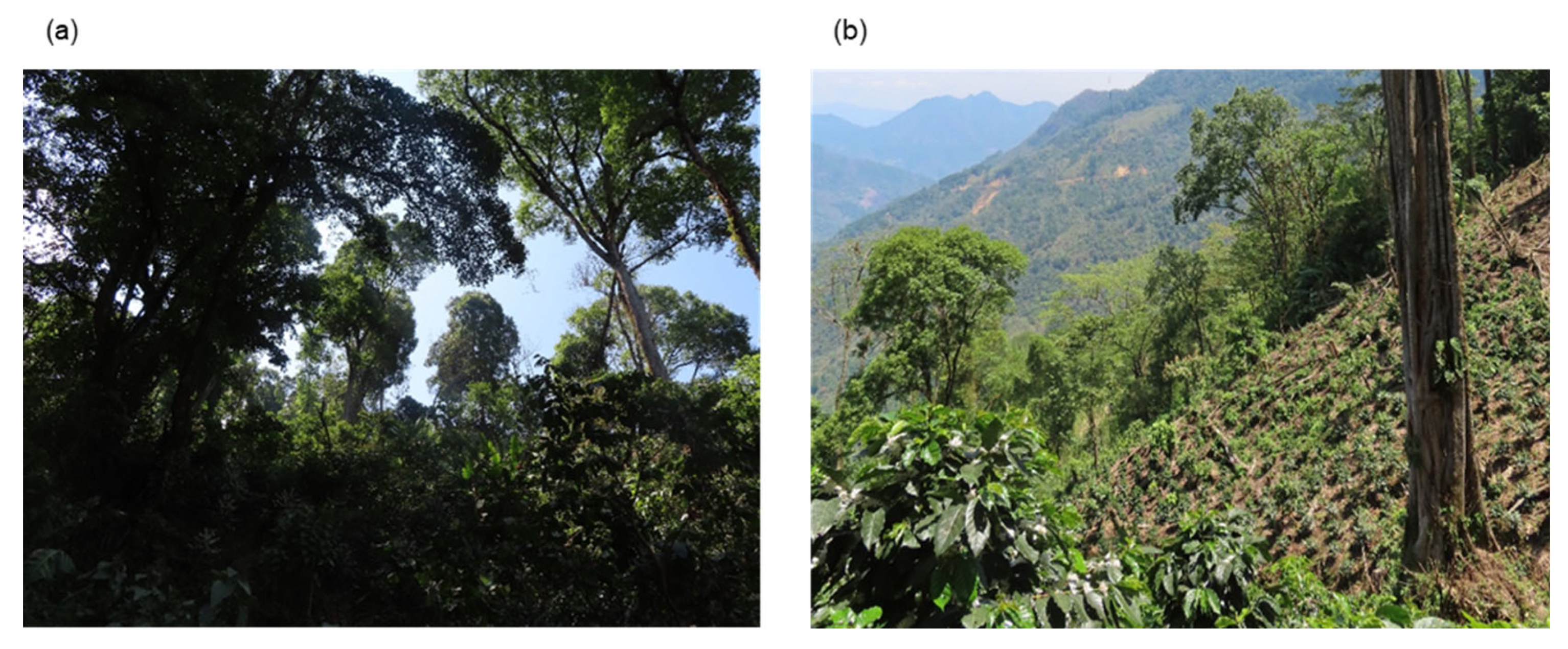
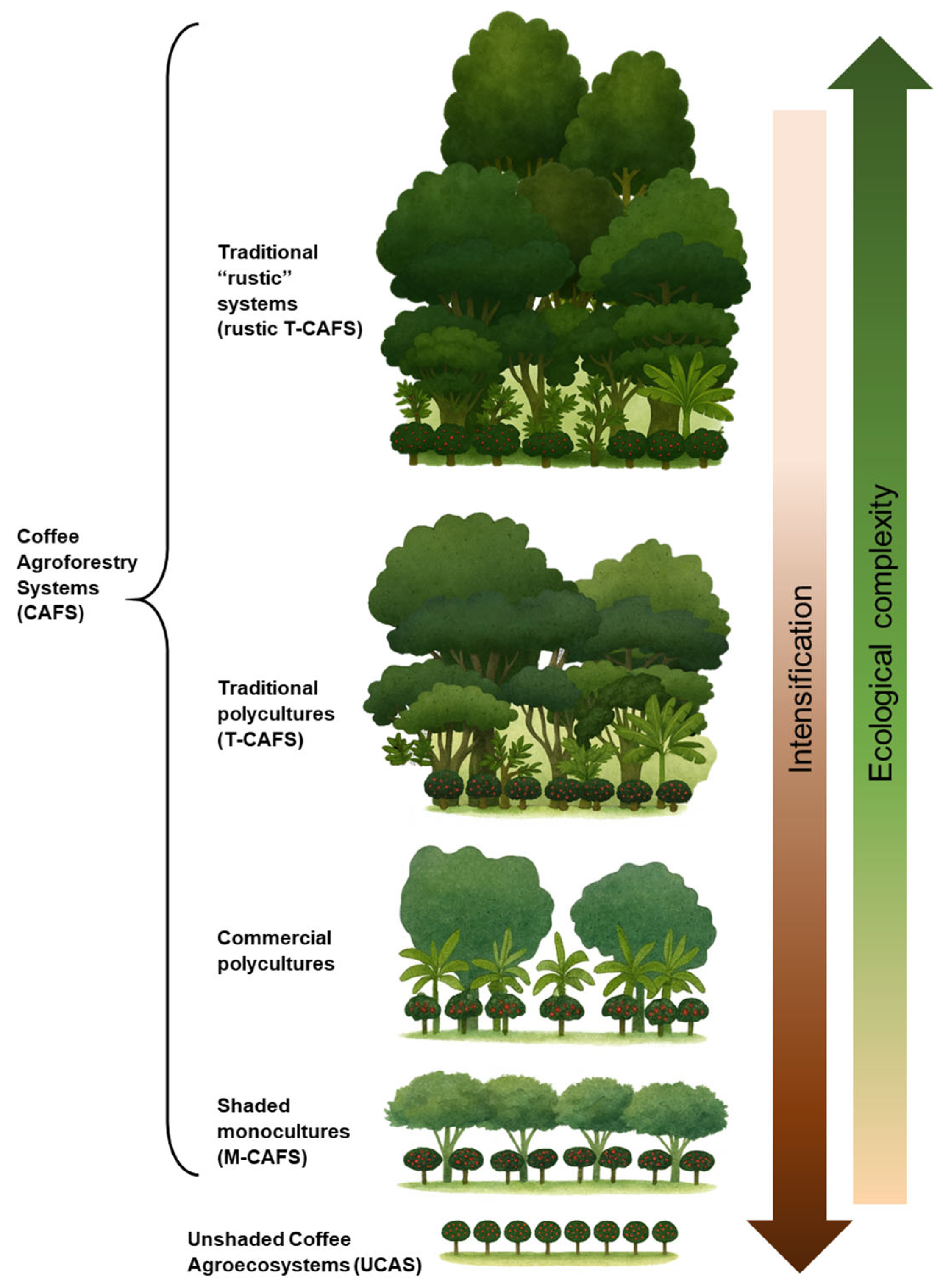
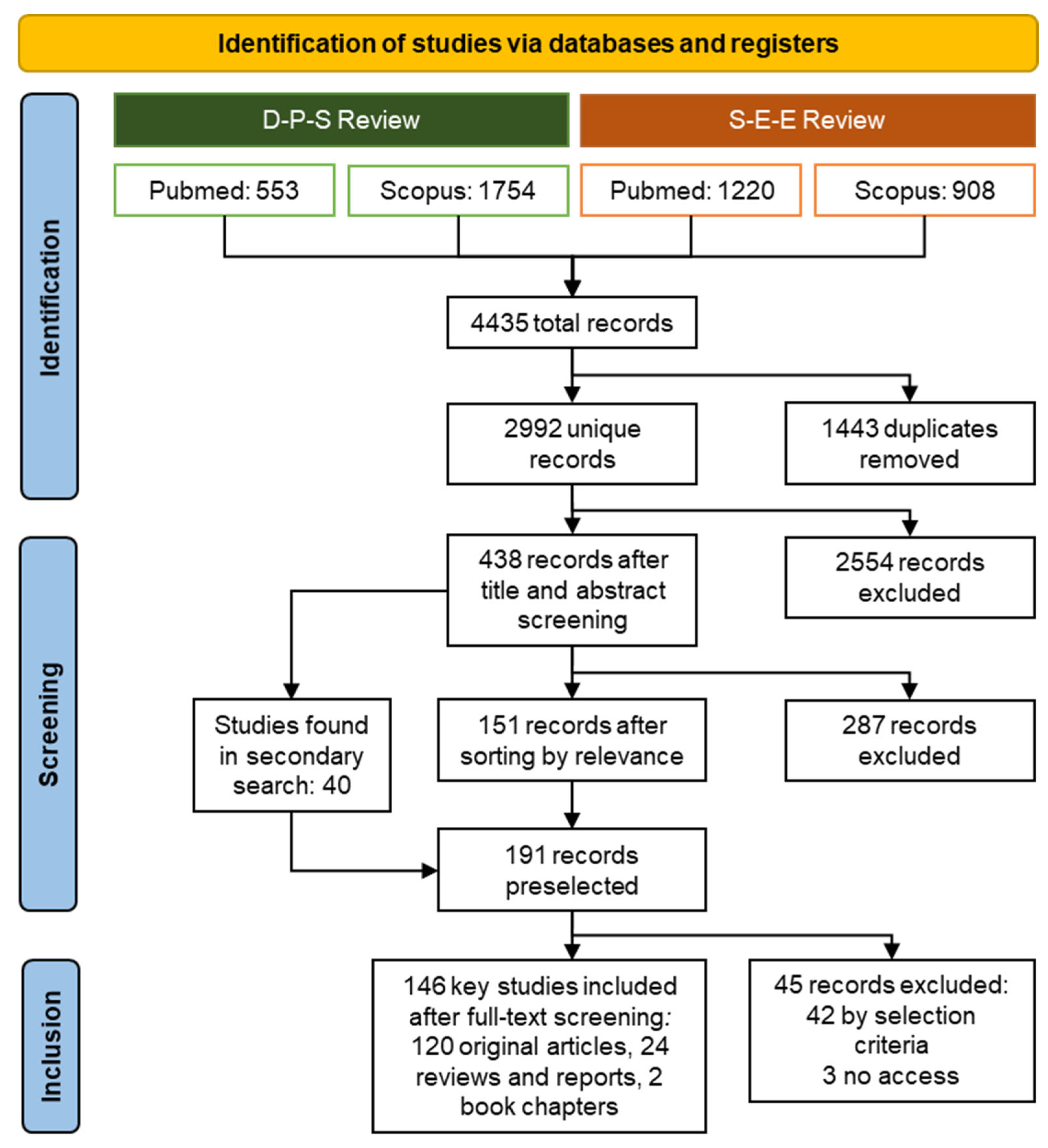
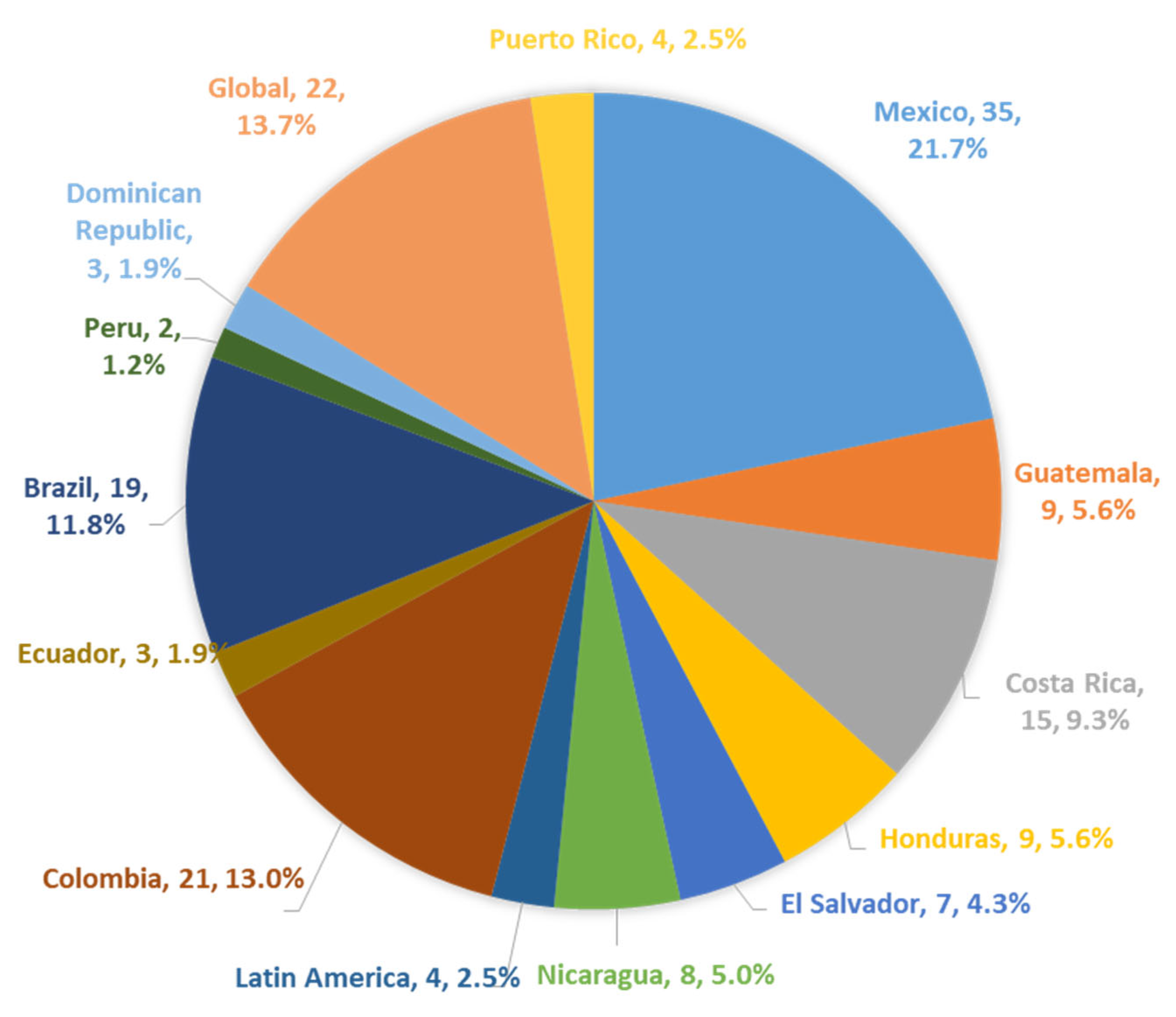
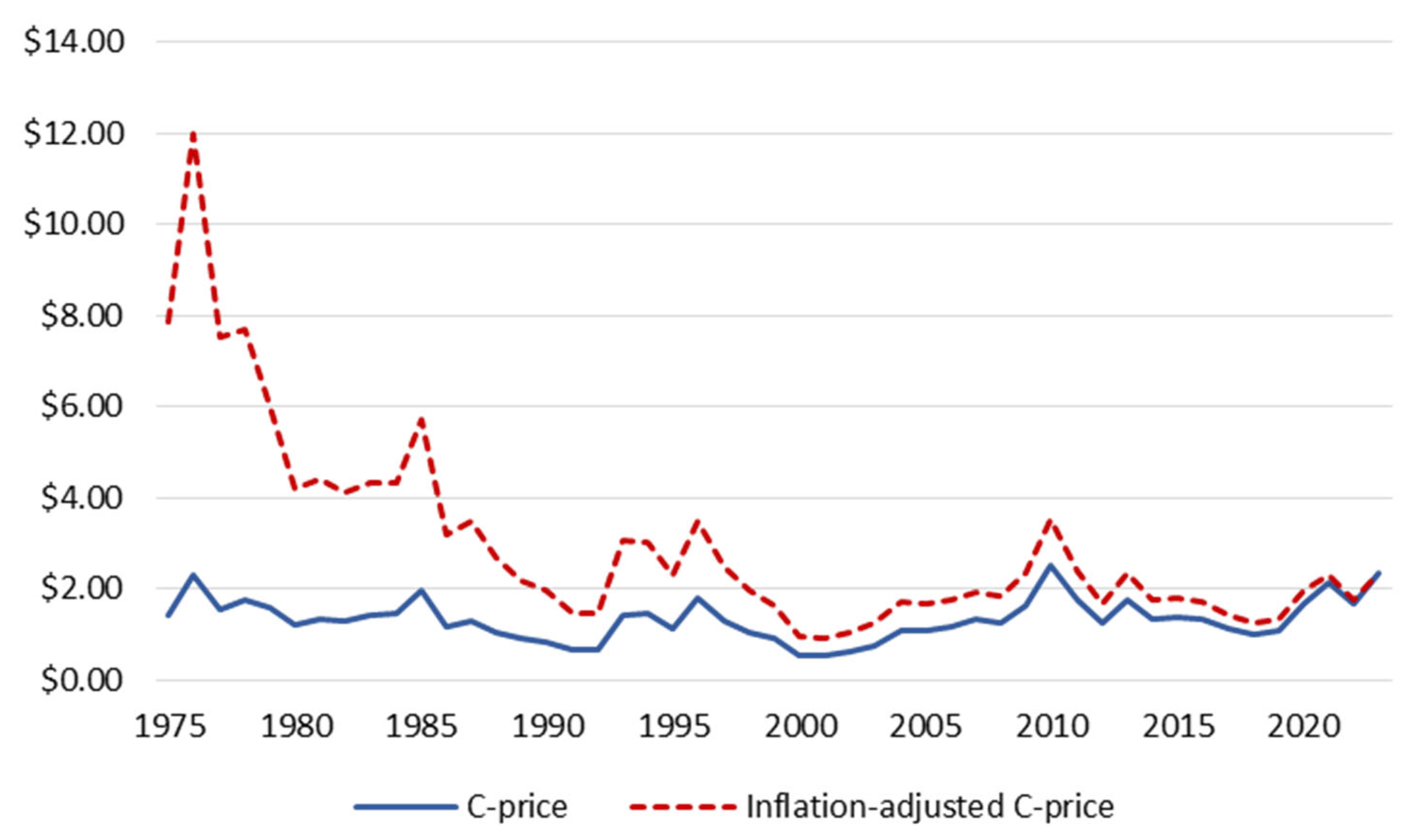
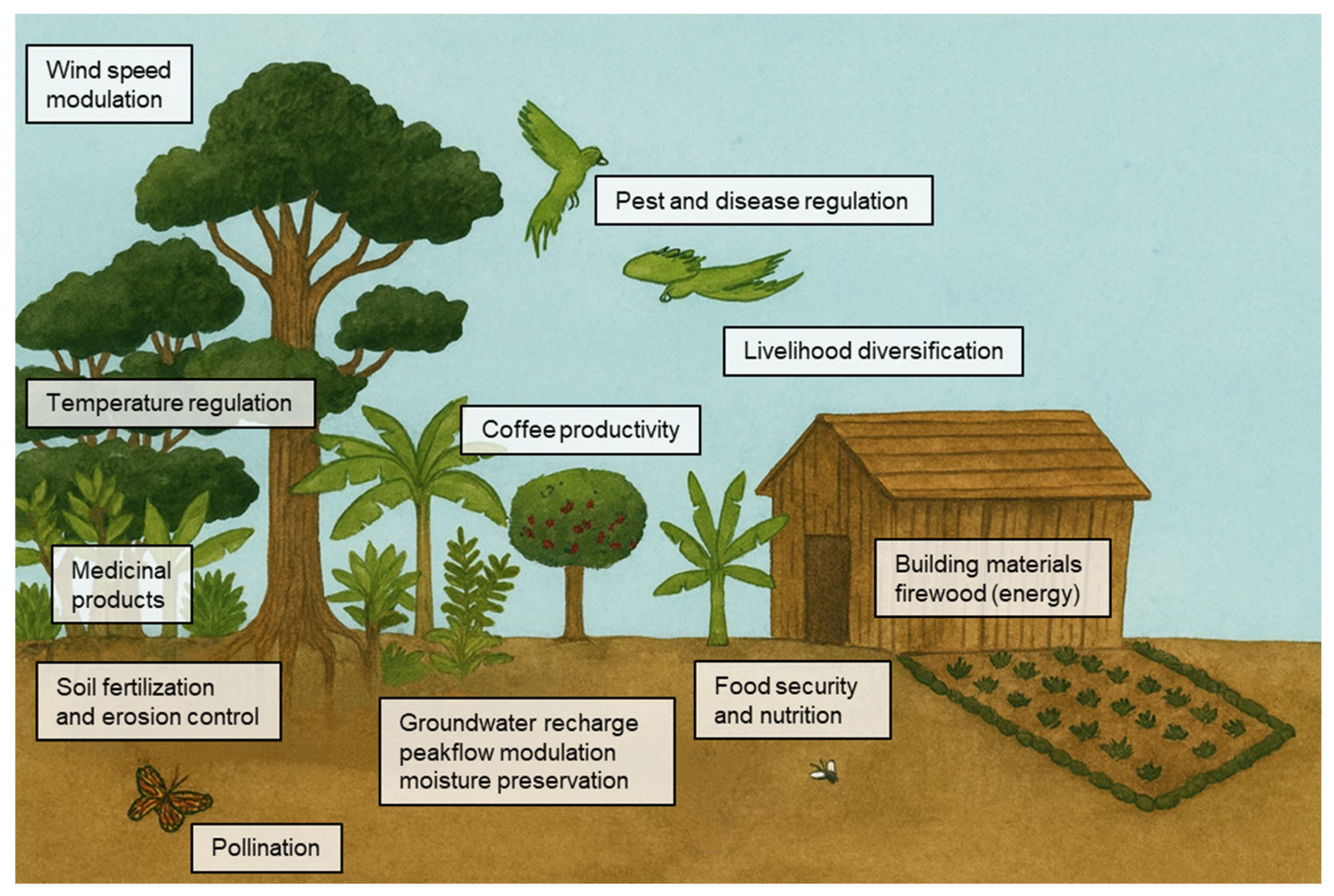
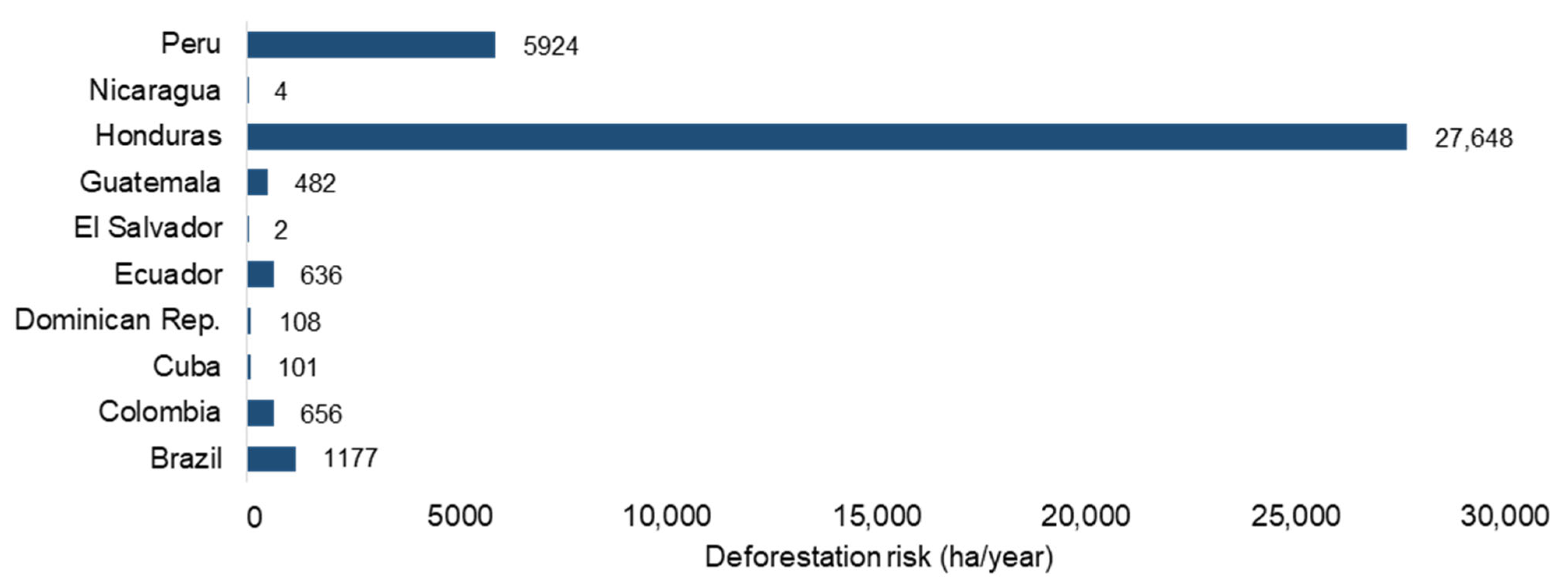
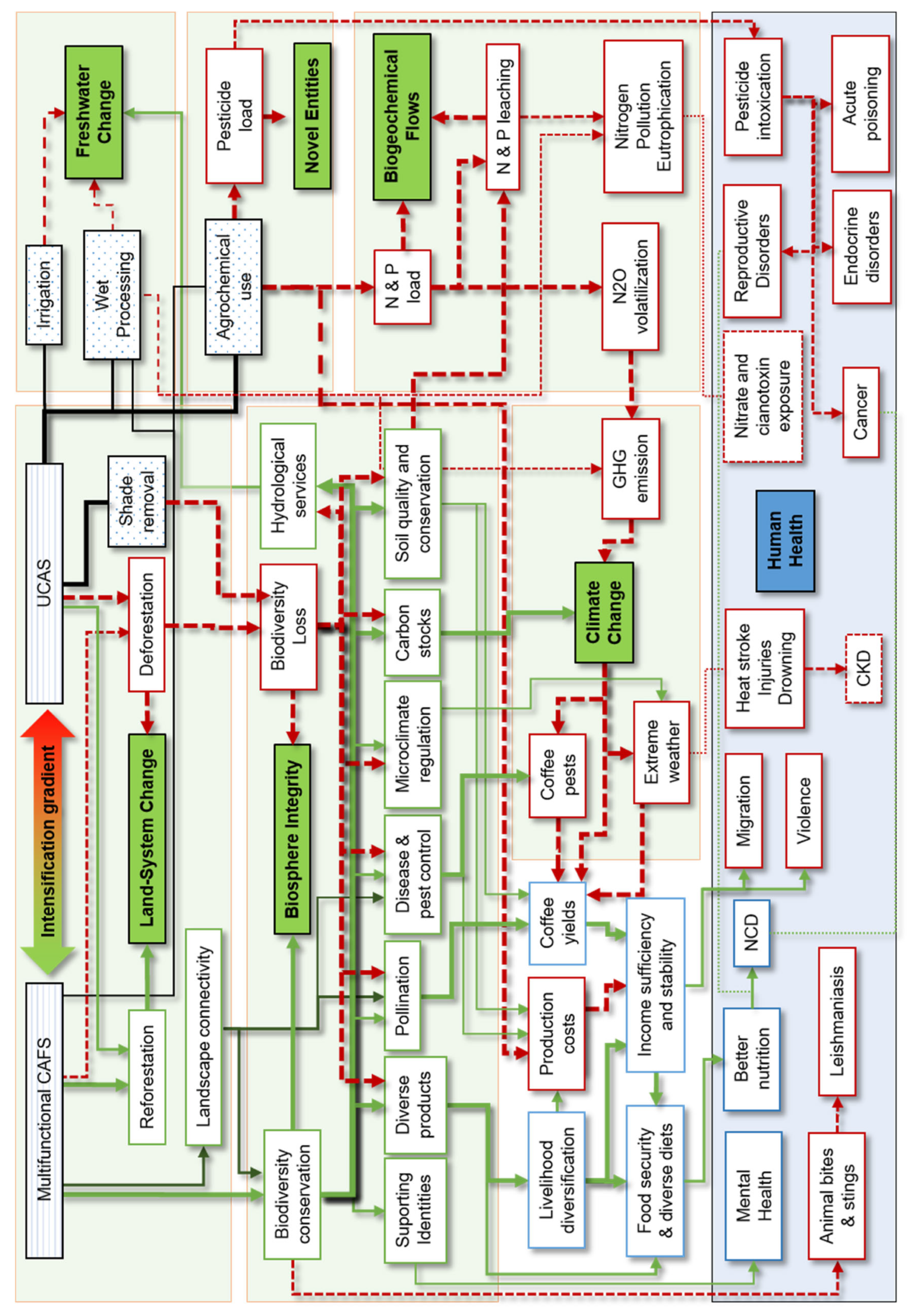
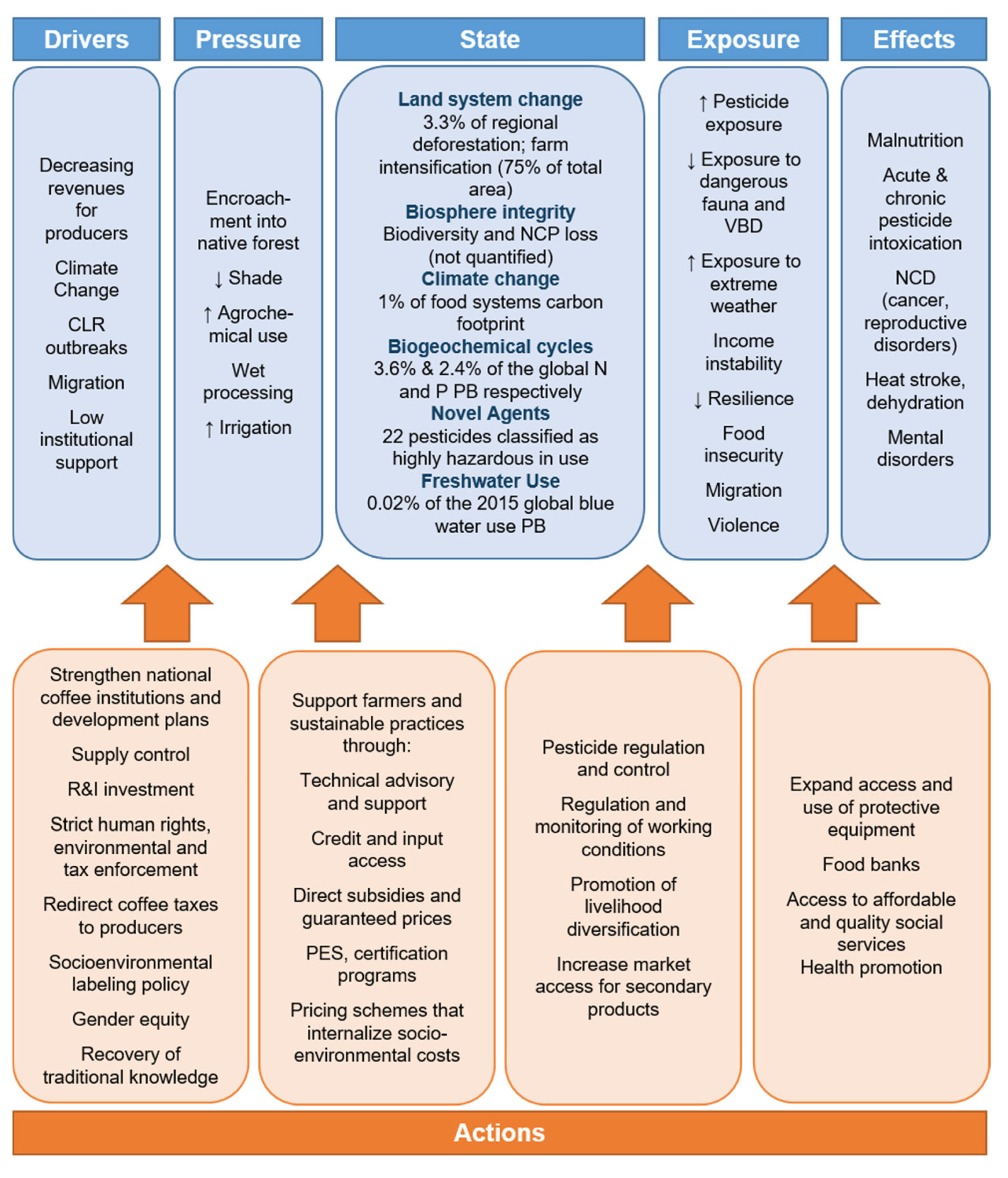
| Element | Keyword Sample |
|---|---|
| CAS in Latin America | Coffee, system, growing, harvesting, farming, agroecosystem, agroforestry, farming, plantation, smallholder, shaded, sun, unshaded, monoculture, landscapes, etc. |
| Planetary boundaries | Climate change, global warming, biodiversity, conservation, nitrogen, phosphorus, land use, land system, deforestation, pollution, freshwater, agrochemical, fertilizer, pesticide, etc. |
| Geographical delimitation | List of 18 Latin American countries |
| Human health and its determinants | Health, exposure, infections, zoonosis, vector, food security, nutrition, income, poverty, migration, violence, mental, gender, intoxication, water security, extreme weather, bite, sting, etc. |
| Inclusion Criteria |
| Peer-reviewed research papers, reviews, and book chapters, and gray literature including reports, policy documents, conference papers, theses, and preprints clearly reporting data sources and methodologies. Studies reporting results related to coffee farming in Latin America. Studies that describe the drivers of change in CASs and their impact on six of the PBs (climate change, biosphere integrity, land system change, biogeochemical flows, freshwater use, and novel entities) OR studies that describe the effects of CASs, their transformations, or their environmental impacts on the health of human populations and its determinants. Studies that provide key insights in terms of thematic representativeness, strength of evidence, and alignment with the DPSEEA model. Studies published in English or Spanish. |
| Exclusion criteria: |
| Studies whose results are not related to coffee farming in Latin America. Studies describing ecological impacts of CASs that cannot be classified under at least one of the six PBs chosen. Studies describing health determinants and outcomes of coffee farmers, farmworkers, or coffee-growing communities that cannot be attributed to CASs, the drivers of their transformations, or the change in at least one of the six PBs chosen. |
| Land System | Soil (t C ha) | Biomass (t C ha) | Total (t C ha) |
|---|---|---|---|
| T-CAFS | 180 | 80 | 260 |
| M-CAFS | 130 | 43 | 173 |
| UCAS | 120 | 7 | 127 |
| Cornfield | 66 | 2 | 68 |
| Grassland | 80 | 8 | 88 |
| Pesticide | Human Health Hazards | Environmental Hazards |
|---|---|---|
| Chlorpyrifos | Reproductive toxicant (GHS) | Highly toxic to bees (EPA) |
| Copper II Hydroxide | Fatal if inhaled (GHS) | Very toxic to aquatic organisms and very persistent in water, soil, or sediment (EPA) |
| Cypermethrin | Highly toxic to bees (EPA) | |
| Cyproconazole | Reproductive toxicant (GHS) | |
| Diazinon | Probable carcinogen (IARC) | Highly toxic to bees (EPA) |
| Disulfoton | Extremely high acute toxicity (WHO Ia) | |
| Diuron | Probable carcinogen (EPA) | |
| Endosulfan | Fatal if inhaled (GHS) | Persistent Organic Pollutant (Stockholm convention) |
| Epoxiconazole | Probable carcinogen (EPA, GHS), reproductive toxicant (GHS) | |
| Glyphosate | Probable carcinogen (IARC) | |
| Iprodione | Probable carcinogen (EPA) | |
| Malathion | Probable carcinogen (IARC) | Highly toxic to bees (EPA) |
| Mancozeb | Probable carcinogen (EPA, GHS), reproductive toxicant (GHS), endocrine disruptor (EU) | |
| Methyl Parathion | Extremely high acute toxicity (WHO Ia), fatal if inhaled (GHS) | Very toxic to aquatic organisms (EPA) |
| Methomyl | High acute toxicity (WHO 1b) | Highly toxic to bees (EPA) |
| Paraquat Dichloride | Fatal if inhaled (GHS) | |
| Pendimethalin | Very bioaccumulative, very persistent in water, soils, or sediments (EPA) | |
| Permethrin | Probable carcinogen (EPA) | Highly toxic to bees (EPA) |
| Simazine | Probable carcinogen (GHS), probable reproductive toxicant (GHS) | |
| Thiamethoxam | Highly toxic to bees (EPA) | |
| Triadimenol | Reproductive toxicant (GHS) | |
| Triazophos | High acute toxicity (WHO 1b) |
Disclaimer/Publisher’s Note: The statements, opinions and data contained in all publications are solely those of the individual author(s) and contributor(s) and not of MDPI and/or the editor(s). MDPI and/or the editor(s) disclaim responsibility for any injury to people or property resulting from any ideas, methods, instructions or products referred to in the content. |
© 2025 by the authors. Licensee MDPI, Basel, Switzerland. This article is an open access article distributed under the terms and conditions of the Creative Commons Attribution (CC BY) license (https://creativecommons.org/licenses/by/4.0/).
Share and Cite
Hersch-González, E.; Riojas-Rodríguez, H. The Planetary Health Impacts of Coffee Farming Systems in Latin America: A Review. Challenges 2025, 16, 57. https://doi.org/10.3390/challe16040057
Hersch-González E, Riojas-Rodríguez H. The Planetary Health Impacts of Coffee Farming Systems in Latin America: A Review. Challenges. 2025; 16(4):57. https://doi.org/10.3390/challe16040057
Chicago/Turabian StyleHersch-González, Emiliano, and Horacio Riojas-Rodríguez. 2025. "The Planetary Health Impacts of Coffee Farming Systems in Latin America: A Review" Challenges 16, no. 4: 57. https://doi.org/10.3390/challe16040057
APA StyleHersch-González, E., & Riojas-Rodríguez, H. (2025). The Planetary Health Impacts of Coffee Farming Systems in Latin America: A Review. Challenges, 16(4), 57. https://doi.org/10.3390/challe16040057





